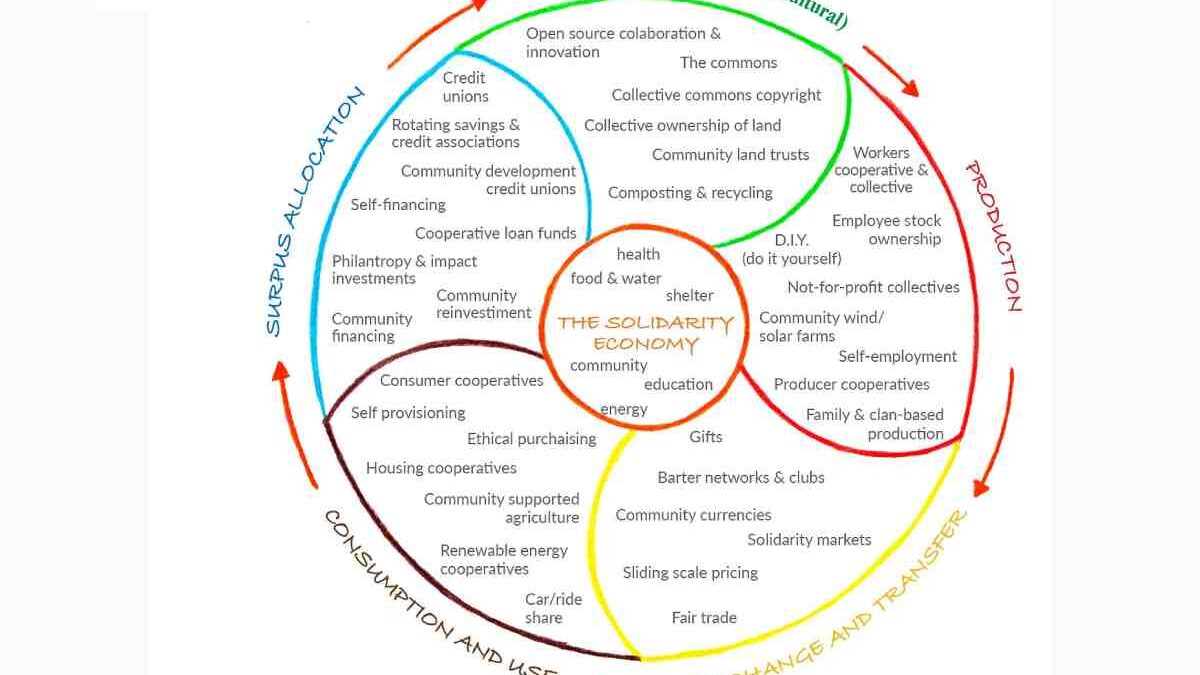The solidarity economy is a theoretical and practical search for alternative ways of doing an economy based on solidarity and work.
The principle or foundation of the economy of solidarity is that the introduction of growing and qualitatively higher levels of solidarity in economic activities, organizations, and institutions, both at the level of companies and in markets and public policies, increases micro-efficiency. And macroeconomic, along with generating a set of social and cultural benefits that favor the whole of society.
Table of Contents
The Solidarity Economy Is A Natural
Poverty, exclusion, and marginalization affect multitudes of human beings, social sectors, and entire peoples in various world regions.
Unemployment And Unemployment Of High And Growing Percentages Of The Labor Force.
The limits and insufficiencies of the widespread informal or popular economy can be strengthened and find appropriate channels for a better insertion in the markets in the solidarity economy. The solidarity economy has proven in many cases to be an alternative capable of leading many informal workers in an organized way, of operating with greater efficiency.
The Enormous And Growing Injustices And Social Inequalities Generated
The prevailing economic system translates into processes of disintegration of social coexistence. As the solidarity economy is a fair and human form of financial organization, its development can effectively overcome this series of serious problems that negatively impact our societies
The Poor Situation In Which Women Find Themselves In Many Countries.
The field of work and the economy make it difficult to access and participate in a leading role in economic, social, and cultural activities and organizations. Solidarity economy has proven to be how women and families find new and vast possibilities of participation, development, and empowerment of their searches based on gender identity.
The Crisis Of Traditional Cooperative, Mutualist, And Self-Managed Forms.
The solidarity economy is perceived as an appropriate path of renewal and foundation of the search for associative and participatory economic conditions that put man and the community above things and labor over capital.
The Deterioration Of The Environment
And ecological balances are mainly derived from individualistic ways of producing, distributing, consuming, and accumulating wealth. The solidarity economy guides towards new forms of production and consumption, socially and environmentally responsible.
The Solidarity Economy Is An Excellent Project Of Development, Transformation, And Improvement Of The Economy:
When with severe and profound reasons many today question the convenience and even the possibility of continuing economic growth, in the forms currently in force, the economy of it postulates a new type of development, alternative, integral, on a human scale, sustainable, with an emphasis on the local. Another product supposes another it and that other economy for a new type of development can be the solidarity economy, or at least, constitute a component that makes an essential contribution in that direction.
When The Capitalist Seems To Have Established Itself As The Only Efficient Economic Organization Mode.
Despite its enormous social and environmental costs. When socialist projects base on the State and planning have fail to establish a just and humane economy. And also The social and spiritual energies are oriented towards social transformation and seeking ethically superior forms of economic organization. Center on the values of justice, equity, freedom, society, and community. They find themselves disoriented in the face of an adverse reality that seems so impossible to change.
When despair spreads, and the conviction applies that “more of the same” will not lead humanity to new horizons; in this problematic historical context. And also That there are not a few who conceive as a genuine crisis of civilization. The economy of solidarity appears as the only new way of thinking and projecting practical and profound transformational processes. Capable of arousing the conscience and the will of the vastest sectors. That yearn for a better life and a more humane society and convivial
The Solidarity Economy Is A Fundamental Process In Which The Searches Of Various And Multiple Sectors And Groups Converge.
- Famous groups and grassroots organizations are organize in solidarity to face their needs and problems. People from all social groups want to develop new. And also Efficient business initiatives consistent with the social and ethical sense that they intend to establish in their activities.
- Cooperative, mutualist, and self-managed movements find new perspectives and concepts that enhance their experiences in the solidarity economy. And also Ecological organizations and movements discover that unsupportive economic and development forms cause environmental problems.
- Original peoples struggle to recover their identity and find a modern economic. Form in the solidarity economy in which values and social relations are apply and live. According to their traditional community cultures.
And also Non-governmental organizations propose human and social development objectives and aspire to contribute with new initiatives and experiences to local. And also Alternative, sustainable development processes.

